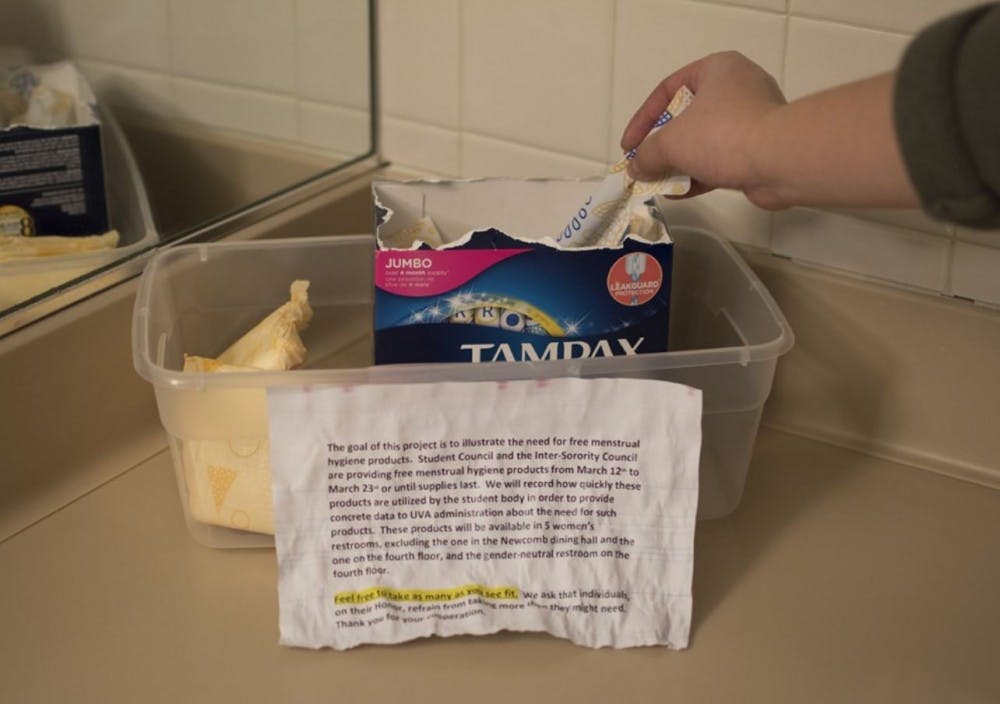Student Council and Madison House began a joint project this week to provide free menstrual hygiene products to students off-Grounds. The products will be available in the first floor bathrooms of Madison House until Sept. 21, or while supplies last.
Katie Kirk, a second-year College student and the chair of the Student Council Safety and Wellness Committee, said the initiative is a continuation of a previous project undertaken last semester by Student Council and the Inter-Sorority Council.
“Our goal is to show that there is a need for access to basic hygiene products on Grounds,” Kirk said in an email to The Cavalier Daily. “We have found that a lack of access to these products are adding extra stressors [and] burdens to those [individuals] who have a menstrual cycle.”
This past March, in response to conversations happening at other universities and to increased interest in the University student body, Student Council conducted a two-week trial program with the Inter-Sorority Council to offer free feminine hygiene products. Together the organizations placed around $400 worth of tampons and pads in several bathrooms in Newcomb. Data collected by the organizations showed the products ran out in a matter of days.
For the second “Free Menstrual Hygiene” event, according to Kirk, Student Council spent $163.88 on 646 tampons and 238 pads, totaling 884 products.
Julia Hohenstein, a third-year Commerce student and member of the Madison House Board of Directors, said when Madison House learned about the success of last semester’s project, they reached out to Student Council and offered to co-lead a similar project in the first-floor restrooms of Madison House. Madison House is a non-profit volunteer organization, which is unaffiliated with the University, located at 170 Rugby Road near the Fralin Museum of Art.
Hohenstein added that the products were purchased by Student Council, while Madison House will distribute and gather data regarding product usage to allow Student Council to further examine how such a program might operate at the University.
“I think because Madison House, while it’s about service, it’s also about increasing access for people, whether that’s access to a tutor through a tutoring program or access to a mentor through our big brother, big sister program,” Hohenstein said. “This is all about access to healthcare options which is something that is so important, and that is why Madison House is proud to be part of this project.”
Hohenstein also said — while Madison House is not contributing financially to the current effort as such an action would require approval from the organization’s board of directors — it is an area which deserves greater attention at the University and beyond.
In 2013, entrepreneur Nancy Kramer gave a lecture at a TEDx event championing the idea that women should have access to all of the necessities that they need to care for themselves in public restrooms. Her movement sparked similar initiatives in workplaces and universities — in 2016, Brown University spearheaded a campaign to provide tampons and pads in women’s, men’s and gender inclusive restrooms.
As a result, over 40 universities reached out to the student government at Brown University about starting their own program — including Cornell, Yale, Bucknell, Duke, the University of Connecticut and the University of Wisconsin, Madison — to offer free menstrual hygiene products in campus restrooms. The movement continues to spread, as students at American University, Emory University, the University of California at Los Angeles and the University of Arizona petition their administrations for funding.
James Madison University also recently engaged in a “Free the Tampon” campaign. The project, modeled after Brown University’s efforts, began with a bill of opinion, which over 2,000 students signed, and resulted with the senior administration approving it. Today, menstrual hygiene products can be found in both women’s and gender-inclusive bathrooms around JMU.
When asked for their thoughts on Student Council and Madison House’s pilot program, several female students expressed support, but also voiced concerns about the project’s longevity and reliability moving forward.
“It would be nice to be able to get up from class and just go and get [a feminine hygiene product], but it would have to be guaranteed that they were there,” third-year College student Summer Allen said. “I would not necessarily rely on that right away.”
Third-year Nursing student Eleni Lazarides said she thought the project was worthwhile.
“People are human and forget things so it’s nice that U.Va. has my back, but it would take lots of time to know for sure they were there and to build my trust,” Lazarides said. “The more you do it, though, the more you figure out how people react and how much of a success it is. I think it is worth it to keep trying if they have the resources.”
According to Kirk, as long as the pilots prove successful as they generally have at other universities, Student Council will host two more free menstrual hygiene events, where they will offer a limited supply of products for a predetermined time period, further collect data and gauge student interest.
Kirk said that if the data reveals that there is a real need for publicly available feminine hygiene products at the University, Student Council plans to approach the Board of Visitors and request regular funding for stocking restrooms around Grounds with such products.
Currently, the student health fee at the University is $624 for the 2018-19 year. It is unclear how the implementation of a feminine hygiene products program might affect this rate.
University spokespersons did not respond to repeated requests to comment on this article.







